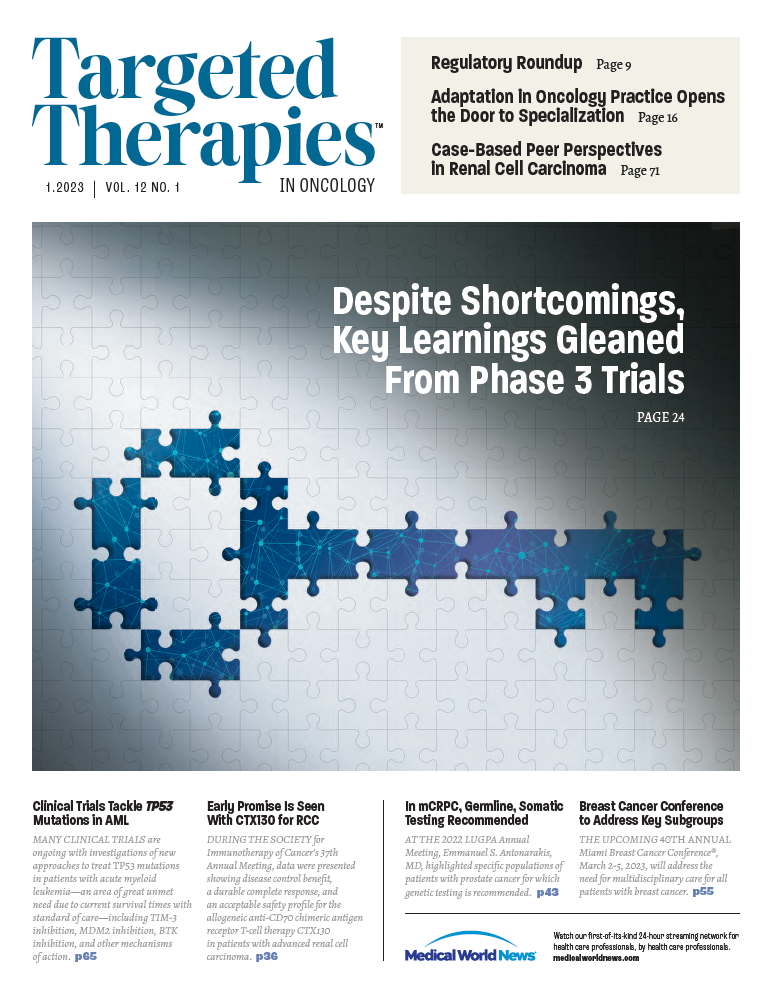Early Promise Is Seen With CTX130 for RCC
According to findings from the phase 1 COBALT-RCC trial, CTX130 led to an objective response rate of 8%, a stable disease rate of 69%, and a disease control rate of 77% in patients with advanced clear cell renal cell carcinoma.

The investigational allogeneic CRISPR-Cas9 gene-edited, anti-CD70 chimeric antigen recep-tor (CAR) T-cell therapy, CTX130, led to an objective response rate of 8%, a stable disease (SD) rate of 69%, and a disease control rate of 77% in patients with advanced clear cell renal cell carcinoma (RCC). Findings from the phase 1 COBALT-RCC trial (NCT04438083) were presented during the Society for Immunotherapy of Cancer’s 37th Annual Meeting.1
In 13 evaluable patients, 1 had a partial response that became a complete response (CR) by 3 months, with a maintained CR at 18 months. As of 4 months, 4 patients had SD. The therapy had an acceptable safety profile across all dose levels, with no dose-limiting toxicities (DLTs). Of the 14 patients in the study, 50% had grade 1/2 cytokine release syndrome (CRS), 3 of which were related to CTX130. The median time to CRS onset was 1 day, with a median duration of 2 days. Three patients had serious adverse events (AEs) that were infec-tions, all of which were unrelated to CTX130. There was 1 death of pneumonia with grade 4 dyspnea, which was not considered to be related to treatment.
“This first-in-human clinical trial exploring CD70 CAR T-cell therapy in clear cell renal cell carcinoma showed a tolerable safety profile, with no unexpected on-target, off-tumor toxicities and encouraging antitumor activity,” lead study author Sumanta K. Pal, MD, a professor in the Department of Medical Oncology and Therapeutics Research and codirector of the Kidney Cancer Program at City of Hope in Duarte, California, said in a presentation during the meeting. “To our knowledge, this durable [CR] is the first to be achieved with allogeneic CAR T-cell therapy in patients with relapsed/refractory solid tumors.”
CD70 is a CD27 ligand that has transient expression on activated lymphocytes, and it is found to be highly expressed in clear cell RCC tumor samples. CTX130 is a first-in-class, CD70-targeting allogeneic CAR T-cell therapy that is being evaluated in patients with advanced clear cell RCC. The therapy has targeted disruption of the T-cell receptor α constant (TRAC), β2 microglobulin, and CD70 loci. With the use of an adeno-associated virus vector, an anti-CD70 CAR cassette is inserted into the TRAC locus by homology-directed repair.
The CAR T-cell therapy is manufactured from healthy donor T cells that are then selected and edited prior to expansion and cryopreservation for off-the-shelf use. Preclinical data demonstrated encouraging signals in an RCC xenograft model, Pal noted.
In the open-label, multicenter, international, single-arm COBALT-RCC trial, investigators sought to evaluate the safety and efficacy of CTX130 in patients with advanced clear cell RCC (FIGURE1). The study had 2 parts: a dose-escalation portion (part A) and a cohort expansion portion (part B).
Patients underwent lymphodepletion with fludarabine at 30 mg/m2 plus 500 mg/m2 of cyclophosphamide for 3 days on days –5, –4, and –3. CTX130 infusion began on day +1, with the dose-escalation design: 3 × 107 (dose level 1), 1 ×108 (dose level 2), 3 × 108 (dose level 3), and 9 × 108(dose level 4).
To be eligible for enrollment, patients with unresectable or metastatic RCC with clear cell differentiation had to be at least 18 years old and have a body weight of 42 kg or higher. Prior exposure to a checkpoint inhibitor and VEGF inhibitor were required. Patients also had to have a Karnofsky performance status of at least 80%, as well as adequate renal, liver, cardiac, and pulmonary organ function. Those who had prior treatment with anti-CD70 therapy, CAR T cells, or any other modifi ed T or natural killer cells were excluded from enrollment, as well as those with a history of central nervous system, cardiac, or pulmonary conditions and prior solid organ transplantation or bone marrow transplant.
The primary end point of part A of the trial was incidence of AEs via DLTs; in part B, the primary end point was objective response rate (ORR) per RECIST v1.1 criteria. Secondary end points were best overall response, progression-free survival, and overall survival.
The median age was 64.5 years (range, 54-77), and 85.7% of patients were men. All patients had stage IV metastatic disease and previously received systemic therapy; 64.3% and 92.9% of patients received prior radiotherapy and surgery, respectively.
A total of 57.1% of patients had Inter-national Metastatic Renal Cell Carcinoma Database Consortium intermediate-risk disease, whereas 42.9% of patients had high-risk disease. An estimated glomerular filtration rate of less than 60 mL/min/1.73 m2 was reported in 42.9% of patients. The median time from diagnosis was 4.9 years (range, 0.7-24.0), and the sum of diameters for target lesions was 64 mm (range, 12-141).
Pal added that typical pharmacokinetics were seen, with peak time to expansion at a median of day 10 and peak concentration of approximately 3500 copies/μg.
REFERENCE
1. Pal SK, Tran B, Haanen JB, et al. CTX130 allogeneic CRISPR-Cas9–engineered chimeric antigen receptor (CAR) T cells in patients with advanced clear cell renal cell carcino-ma: results from the phase 1 COBALT-RCC study. Presented at: Society for Immunotherapy of Cancer’s 37th Annual Meeting; November 6-10, 2022; Boston, MA. Accessed December 5, 2022. https://bit.ly/3VNBum4

Enhancing Precision in Immunotherapy: CD8 PET-Avidity in RCC
March 1st 2024In this episode of Emerging Experts, Peter Zang, MD, highlights research on baseline CD8 lymph node avidity with 89-Zr-crefmirlimab for the treatment of patients with metastatic renal cell carcinoma and response to immunotherapy.
Listen
Beyond the First-Line: Economides on Advancing Therapies in RCC
February 1st 2024In our 4th episode of Emerging Experts, Minas P. Economides, MD, unveils the challenges and opportunities for renal cell carcinoma treatment, focusing on the lack of therapies available in the second-line setting.
Listen